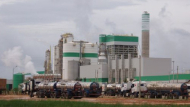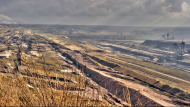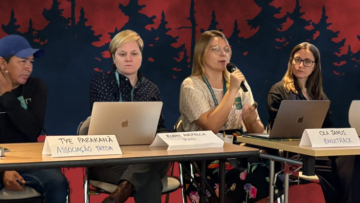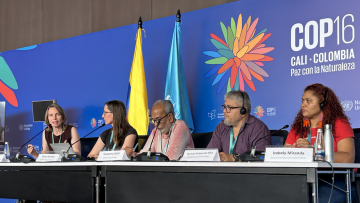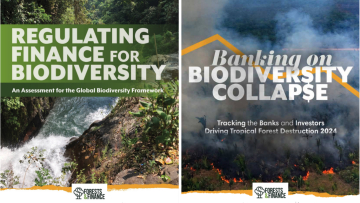
Taskforce on Nature-related Financial Disclosures (TNFD)
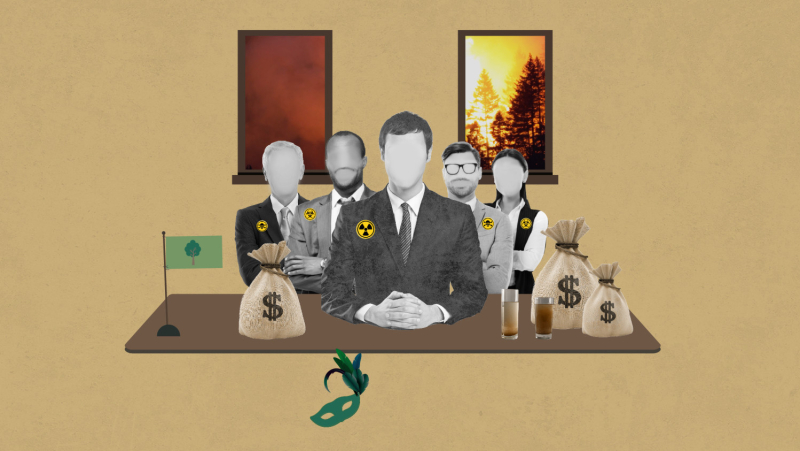
About TNFD
The Taskforce on Nature-related Financial Disclosures (TNFD) is a “market-led, science-based and government-backed initiative” set up by UNDP, UNEP, Global Canopy and WWF to serve as a global standard for nature-related disclosure. The TNFD is promoting its corporate-written framework as the basis for future biodiversity-related regulation. Its first attempt to achieve this took place at CBD COP16 in Cali, Colombia. In one of the official draft texts on the resource mobilisation strategy (CBD/SBI/REC/4/3, dated 29 May 2024), the TNFD was explicitly mentioned as one of the recommended frameworks for monitoring, assessing and transparently disclosing the biodiversity risks, dependencies and impacts. In the final version of the text, however, the reference to TNFD was moved to the footnotes. TNFD also claims to be supported by many governments and held a government briefing during the COP16 summit. The recording is not available to the public.
However, TNFD is structurally not aligned with the Target 15 of the Global Biodiversity Framework. Additionally, TNFD’s track record—rejecting numerous civil society and expert recommendations, as well as ignoring critical voices from the Indigenous groups here and here, puts in question their ability to raise to the occassion.
So what are the major problems with the TNFD
The final disclosure framework does not include our most crucial recommendations. In short, TNFD adopters do not have to:
-
Give up the profits they made from harmful activities & financing.
-
Provide remedy and redress to people or ecosystems harmed by their activities.
-
Disclose where exactly they are operating, buying from or financing.
-
Disclose complaints or allegations against it of serious environmental or human rights harms.
-
Report where it was linked to illegal practices or fined for illegal practices, when not required by the law.
TNFD aims to provide decision-makers in business and capital markets with better quality information through corporate reporting on nature. On their website, TNFD says that “better information in the hands of investors and other capital providers can help shift the flow of global capital to more positive outcomes for nature and society”. However, it is hard to make the right decisions with incomplete information.
A true disclosure framework
If TNFD is really serious about a disclosure framework that truly embraces transparency it could show this by:
-
Community's Right to Know: If affected communities could easily find out if companies are operating or sourcing in their area. Transparency like this would be a game-changer and a first step to engage in meaningful dialogue. This is currently not the case.
-
Materiality: Right now TNFD's focus on enterprise value limits the scope. It also sets a lower bar than requirements already in place in some trading blocks. (i.e. EU and major Chinese stock exchanges). Requiring double materiality would mean that businesses need to disclose not only how nature-related issues affect them but also both their impacts on biodiversity.
-
Fact-Checking Claims: With high-level metrics, it’s impossible to verify reported claims. Publicly available datasets would allow for real, independent fact-checking against ground realities. This is why disclosure frameworks exist.
-
Systemic Reporting of Complaints: Transparency is key. Businesses should systematically disclose complaints or allegations regarding their biodiversity and human rights practices.
-
Human Rights: Elevating human rights to a central role in the TNFD framework, is fundamental to achieving biodiversity outcomes.
-
Remedy & Redress: TNFD should require all adopters to have credible and operational grievance mechanisms. Without this mechanism, affected communities have no formal process to seek justice or address the harms caused by environmental and social impacts. A robust grievance system is essential to ensure accountability and uphold the rights of those most vulnerable.
-
Exclusion Mechanism: Implement a clear process for excluding or suspending companies engaged in egregious practices or greenwashing.
A full and extensive summary of what is wrong with TNFD can be found here.
Tracking the real impacts on nature and human rights
The TNFD framework baseline requires companies and financial institutions to report only those nature and human rights impacts which directly affect their financial performance. However, BankTrack together with partners have been diligently tracking and exposing the environmental, human rights, and climate impacts of many controversial TNFD adopters and taskforce members through our Dodgy Deal profiles. Here is the summary of the current adopters and members.
Table 1: TNFD-adopting companies with adverse Nature impacts
|
Company |
Nature impacts |
Association with TNFD |
|
Drax is the second-largest wood biomass producer. Drax is the largest single CO2 emitter in the UK and burns the equivalent of 138% of the UK’s total annual wood production. Additionally, Drax is sourcing its wood from old-growth forests in Canada, despite claiming that the wood used in its biomass pellets is derived from wholly sustainable sources. |
early adopter |
|
|
Suzano is the world's largest eucalyptus pulp producer. Suzano's operations have led to significant deforestation and land and water degradation, adversely affecting local ecosystems and the rights and livelihoods of indigenous and local communities. Multiple cases of its corporate greenwashing narratives applied by Suzano have been exposed in this report. |
early adopter Taksforce member |
|
|
Vale's mining activities have caused substantial environmental damage, including deforestation and pollution, which negatively impact local ecosystems and threaten the rights and livelihoods of indigenous communities. The Brazilian federal government included Vale in the 'dirty list' of slave labor. |
early adopter |
|
|
Bunge Limited is one of the world’s largest industrial food companies, it controls much of the trade, processing, and sale of soy in the Cerrado – making Bunge a leading driver of deforestation in the region, both through its own plantations and through its control of the soy trade. Bunge has been linked to buying soybeans from companies allegedly supplied by a farmer fined for rainforest deforestation. |
early adopter |
|
|
RWE is Europe's biggest single emitter of CO2 converting its two coal power plants in the Netherlands to burning wood, which emits more carbon per unit of energy than coal and is devasting forest ecosystems. All of the pellets burned in Dutch coal power stations of RWE are imported, but RWE refuses to disclose where its pellets are sourced from but its suppliers Enviva, Graanul Invest, and Pinnacle Pellets routinely source whole logs from clearcut biodiverse, native or old-growth forests for their wood pellets. |
early adopter |
|
|
Olam's is a global integrated supply chain manager, processor and trader of soft commodities like palm oil. In December 2016, Mighty Earth filed a complaint with the Forest Stewardship Council (FSC), detailing evidence that Olam had cleared large areas of rainforest for oil palm and rubber plantation development in Gabon. |
early adopter |
Table 2: TNFD-adopting banks and associated Dodgy Deals
|
Bank Name |
Associated Dodgy Deals |
Impacts of the financing |
Association with the TNFD |
|
Rabobank provides finance to companies carrying out illegal deforestation, creating mass pesticide pollution, and causing ongoing violence towards Indigenous land stewards. |
Early adopter, Taskforce member |
||
|
Sumitomo Mitsui provides finance to companies that are profiting from illegal land grabbing and dangerous monoculture farming. |
Early adopter |
||
|
UBS provides financial support to , companies that are harvesting native hardwood forests and performing illegal land grabs. |
Early Adopter Taksforce member |
||
|
BOA provides finance to companies that are logging high conservation value forests, while creating exorbitant water waste and mass plantations, inter alia. |
early adopter, taskforce member |
||
|
BTG provides finance to company productions that dangerously reduce local water quality and quantity, and which are also tied to the violence towards and displacement of Indigenous Peoples. |
early adopter |
||
|
JBS , Suzano, UPM-Kymmene |
Credit Agricole provides finance to companies that are tied to mass deforestation, water pollution, drought and forest fires, and Indigenous land grabbing, inter alia. |
early adopter |
|
|
KBC provides finance to agriculture companies that exploit their harvests from ancestral lands and high conservation value, high carbon stock forests. |
early adopter |
||
|
Sime Darby, Bunge, Indofood, Cargill |
Standard Chartered has provided financial support to large scale agriculture companies that carry out mass deforestation and encroach on Indigenous Peoples. Some of these companies like Cargill have a track record of illegal waste dumping and mass illegal deforestation of national forests and protected lands. |
early adopter |
|
|
Sumitomo trust was found to hold shares in Sinar Mas, a company which is responsible for extensive Illegal deforestation, creating fire risk, opaque company structure, and greenwashing. |
early adopter |
||
|
UOB has given financial support to industries that carry out landgrabs and destroy sacred ancestral sites, while also performing deforestation, and destroying peatland. |
early adopter |
||
|
CB has provided financial support to companies that log harvest high conservation value forests, cause local water shortages, and convert grassland into plantations. |
early adopter |
||
|
Mitsubishi has provided financial support for industries with traceable impacts on endangering tiger and elephant populations, as well as polluting water, endangeringIndigenous rights, and more. |
early adopter |
||
|
Mizuho's provides financial support for, Suzano, operations of which have led to deforestation, loss of biodiversity, and soil degradation, negatively impacting ecosystems and local communities. |
early adopter |
||
|
MUFG has provided financial support for companies that practise ,forest clearance and peatland drainage, causing significant habitat destruction, and pollution. |
adopter |
Access to basic information like the name and location of a company or a bank that is operating, sourcing, or financing activities in an area is crucial for any meaningful consultation or consent and the most basic right of local communities. The TNFD’s lack of required transparency on these data hinders justice for at-risk communities, forcing us to conduct costly independent investigations to hold companies accountable for environmental damage. This irony undermines the purpose of a "disclosure framework," allowing TNFD adopters to avoid accountability by not disclosing even essential information.


